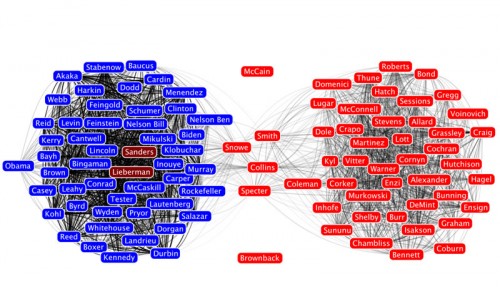It is generally accepted around these parts (Northern California) that the Democratic Party is a circular firing-squad, lacking any internal discipline in the face of the lock-step unity of the Republicans. Internal party discipline is certainly something that the Republicans talk about more openly, and their long stretches as the minority party in the federal legislature has lead to a number of impressive filibusters and procedural maneuvers requiring few or no hold-outs. The relatively recent rise of the right-wing echo chamber on talk radio and other media lend additional credibility to this perception. Even their primary process for nominating a presidential candidate ensures an early knock-out by way of winner-take-all contests rather than the slow bleeding of proportional representation.
Social Action, a tool produced by the University of Maryland, was recently used to show that this may be all perception. Taking the voting records for all US senators during 2007 and feeding these data into a social-network visualizer, you get a bit of a different story. Last year the Democratic and Independent senators voted very similarly to each other. On the other side of the aisle, four Republican senators (Collins, Smith, Snowe, and Specter) broke ranks repeatedly, dragging them out into the center of an otherwise-sharply-divided network. McCain and Brownback, both Republicans, had too few votes on record during the sample period to be meaningfully represented.
Hat tip to Visual Complexity for posting this where I’d run into it.
